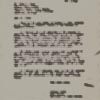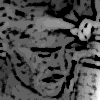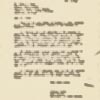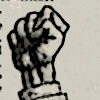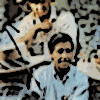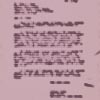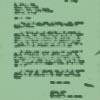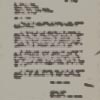"The only requirement was to be a hard worker:" Bracero Oral History
Annotation
In this interview from July 27, 2005, Luis Zamudio Villagómez discusses coming to the United States as a Bracero. He sheds light on the recruitment process, wages, labor and living conditions.
Transcript
Luis Zamudio Villagómez
July 27, 2005
Interviewed by: Anais Acosta
Today is July 27, of 2005, and we are talking with Mr. Luis Zamudio Villagómez in San José California....
AA: How did you learn about the Bracero program at the time?
LZ: Well, I heard a lot of people talking about this guy recruiting people who wanted to work as braceros in the United States.
AA: Where were you hired?
LZ: Well, the first time I came, it was in Monterrey and Nuevo León, and then we would ask for a ride to Monterrey.
AA: How far is Moro León from Monterrey?
LZ: Oh, well, it would take us twelve hours by truck.
AA: That's quite a bit.
LZ: Yes, that's about it, twelve hours.
AA: And who paid for that trip?
LZ: Well, we did, we would pay to go from Moro León to Monterrey. But, after that since we were already in a list ...
AA: I see.
LZ: And, then at the hiring place, everybody would go to a large place, "corralón", that 's how we called it, and there, people got together, and there were tables, and people talking with megaphones, and they would call up those who were needed here, or something like that, that's what I thought.
AA: Did you take your own list, or you signed up on a list after arrival?
LZ: The thing was that somebody over there would sign people up. For example, in Moro León there were "corredores" [recruiters], as we called them, who would sign ten, twenty or thirty people up, "Ok, we will charge you, $200 pesos or $100 pesos", whatever, right?
AA: Why did they charge you? How come?
LZ: Well, I don't know why they charged us, but they did. They wouldn't take us for free. I mean, we had to pay for the trip ...
AA: And besides that, you had to pay ...
LZ: And, apart from that, we would pay, at the time, I remember I would pay $225 when I started.
AA: Like a fee for ...
LZ: Well, to help themselves, or to make a little bit of money for themselves....
AA: Because you already were in the list.
LZ: Yes, we already were in the list.
AA: But, that was up to the recruiters.
LZ: Yes. That was up to them. And, when we heard our names being called, we knew where to go, where to gather up, and whom to talk to.
AA: And, what did they ask for, over there?
LZ: Well, they didn't ask for anything there. But, they would ask our name, address, and make sure we were on the list.
AA: Ah, ok. Like a picture or something of that sort?
LZ: No. They didn't ask for a picture, but for an ID instead.
AA: An ID?
LZ: An ID.
AA: Ah, that's good.
LZ: And, after that, they took us for checkups, like a blood test, or something else.
AA: Like a medical examination?
LZ: Some sort of examination.
AA: What types of test did they do?
LZ: Well, they just took our blood, and, and they would ask us some questions like if we were sick ... something like that.
AA: About your eyesight?
LZ: Yes, mainly about the eyesight because they wanted to make sure we had good eyesight. And, if you were sick, well even then, if they treated you ... because if you were sick they'll send you back.
AA: To a doctor.
LZ: To a doctor.
AA: Did it happen to you that people were sent back because they were sick?
LZ: No, it didn't happen to me.
AA: Did you see anything?
LZ: I didn't see anything, but I only happened to hear that some were not hired ... well because they were sick.
AA: What type of questions were you asked during the examination? or what were the requirements to work as a bracero?
LZ: Well, as I said, the only requirement was that we were in the list, and that we were in good health.
AA: Didn't they ask you about your work in the fields, wasn't that a requirement?
LZ: No. It was not a requirement. The only requirement was to be a hard worker. The main questions they asked were: Where are you from? What type of work do you do over there?
AA: Ah, ok.
LZ: And, well in the fields ...
AA: How old were you the first time you crossed?
LZ: Mmm, the first time, I was seventeen or eighteen, I don't remember exactly. That year I enlisted in the army and we would do that at eighteen or nineteen.
AA: You were going to ...
LZ: I was going join the army, and I think it was when I was eighteen.
AA: So, you didn't have to go then ...
LZ: No. I came back because I had contracts for only 45 days close to Texas.
AA: Not much.
LZ: But, we could renew it if there was more work to do.
AA: They were renewed.
LZ: We would renew them for another 45 days.
AA: Tell me, once you crossed over into the United States, where were you taken?
LZ: Well, when we came here, through Texas ... that's where we crossed. Where was it? I think it was Reynosa ... no, no it was Laredo.
AA: Laredo.
LZ: And once there, they were in charge. Here or in Monterrey, they were in charge. They set up base camps to bring people across the border, and from there, in my case, I was sent to Arkansas to pick cotton.
AA: Pick cotton, Ok. How do you do that?
LZ: Well, you get a sack, a very long sack, and then you pick the cotton that is open
AA: How does the cotton plant look like for those who do not know it?
LZ: Well, the cotton plant is like any other plant of the type of. ...
AA: Is it like a small tree?
LZ: Like small tree, but always tall.
AA: Like a ...
LZ: We would walk four or five yards, and sometimes there would be a "chero" [cotton ball], there were also small ones, but we would pick the whole, because there were balls like this ...
AA: Cotton balls.
LZ: Cotton balls. And, when they opened we pulled them.
AA: The cotton needs to be picked once it is open.
LZ: And that's how it is. But this was a "clean pick", as it is called. In a "clean pick" we only pick the cotton ball, the white one. So, I spent 45 days doing that, during my first contract.
AA: Well, did they tell you how much you were going to make at the time of the contract?
LZ: Well, no...
AA: Didn't they at the beginning, or towards the end?
LZ: I don't remember, but for cotton they always paid us two cents or two cents and a half the pound.
AA: The pound.
LZ: It was ...with cotton it depended on how much we picked.
AA: Yes.
LZ: There was not an hourly rate.
AA: And, you say you got paid two cents per pound.
LZ: About two cents.
AA: How many pounds were you picking?
LZ: Well, we were picking about 200 pounds a day. We made five or four pesos.
AA: Where was that? How was the place where you stayed at?
LZ: Well, it was a big house. We had small size beds.
AA: How many people were there?
LZ: Well, the first time we were there, we were in a room, we called "barraca". There was about thirty of us.
AA: Did they feed you, there?
LZ: No, we cooked it.
AA: You cooked ...
LZ: We had to prepare our meals.
AA: How, was a typical working day, over there? Can you describe it?
LZ: Well, we would get up early morning to prepare our lunch, so that we could eat it by noon. We made our tacos, because we usually used flour, they used... We made more.
AA: Did you make tortillas?
LZ: We made tortillas, we cooked our beans, potatoes or a piece of meat, or whatever, right. Then we would make our tacos and we would leave to pick cotton, and then we would stay the whole day picking cotton, and during the afternoon we would come back. But, they gave us a ride to the place...
AA: Was the field far away?
LZ: Oh, sometimes it was far away, and sometimes we would go walking.
AA: Was it far away the first time, the time you are talking about?
LZ: No. It wasn't far away that time.
AA: And, at what time did you come back from work?
LZ: Well, at about three or four pm.
Source
Division of Work and Industry, National Museum of American History.


